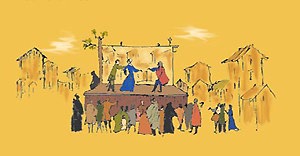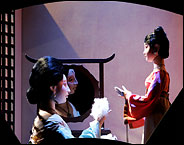Improvisation! - A Glossary

Some good information on this webpage. Click on the title of this post or go to the list of articles and click on Improv Page. Meanwhile, read some of the terms below and see if you can identify some of them in the work we've done in class.
A Glossary of Improv Terms
The following is a list of terms used in teaching and discussing improvisational theatre. If you have any additions or modifications you'd like to see made, email me (broehl@improvcomedy.org).
Accepting
Embracing the offers made by other performers in order to advance the scene.
Advancing
The process of moving the scene forwards.
Ask-for
The question asked of the audience in order to start a scene.
Beat
A unit of action in a scene. A scene is made up of a series of beats.
Blocking
Rejecting information or ideas offered by another player. One of the most common problems experienced by new improvisors. In conventional theatre, the term is used to mean something different (pre-planned stage movement).
Breaking the routine
Interrupting an action with another action in order to advance the scene.
Cancelling
Making previous action irrelevant. Once an action has been cancelled, it's as if it hadn't happened at all. Usually a bad idea.
Charm
The quality that makes an audience enjoy watching a performer.
Commenting
Stepping out of the reality of the scene by saying or doing something that refers to the fact that it's a scene being played. Also refers to "playing" an emotion rather than feeling it. Should be avoided, though used sparingly it can sometimes be effective.
Complementary offer
An offer that meshes well with what's already gone before (and usually enhances it in some way).
Conflict
Many (but not all!) scenes are about a conflict of some sort. If there's no conflict, the scene may still be truthful but somewhat dull.
Context
The broader setting for the scene (political, social, etc).
Corpse
To break up laughing while playing a scene. Usually not a good thing to do.
Denial
See "blocking".
Driving
Taking over a scene and not letting other performers influence its direction. Makes you an unpopular improvisor.
Endowing
Assigning attributes to another performer's character.
Explore and heighten
To take an idea and see where it leads, exploring its natrual consequences while simultaneously raising the stakes.
Extending
Taking an idea and letting it become the central theme of the scene.
Focus
The audience's attention should only be in one place at any given time; that place (or person) is the "focus" of the scene. If more than one thing is going on simultaneously, the focus is split. Experienced improvisors will smoothly share focus, less experienced improvisors often steal or reject focus.
Gagging
Trying to make a joke or do something funny that doesn't flow naturally from the scene. Always a bad idea.
Gibberish
A nonsense language.
Gossip
Talking about things instead of doing them. Also, talking about things that are offstage or in the past or future.
Handle
The premise for a scene or game.
Hedging
Making smalltalk instead of engaging in action.
Information overload
Introducing too much information into the scene, making it difficult or impossible to ever find a satisfying ending that resolves everything.
Instant trouble
Making an offer that introduces a problem or conflict but that doesn't relate to the narrative of the scene prior to that point (see "Offer from space").
Interactive Theatre
Any form of theatre in which the audience is not a passive performer. Encompasses a range of different styles, ranging from "spot" improv to loosely-scripted stories such as murder mysteries or faux events (e.g. Tony and Tina's Wedding).
Masking
Standing in a place where you can't be seen properly, or in such a way that you're hiding someone else or some important action. Should be avoided.
Mugging
Making silly faces instead of reacting truthfully. Generally frowned upon.



